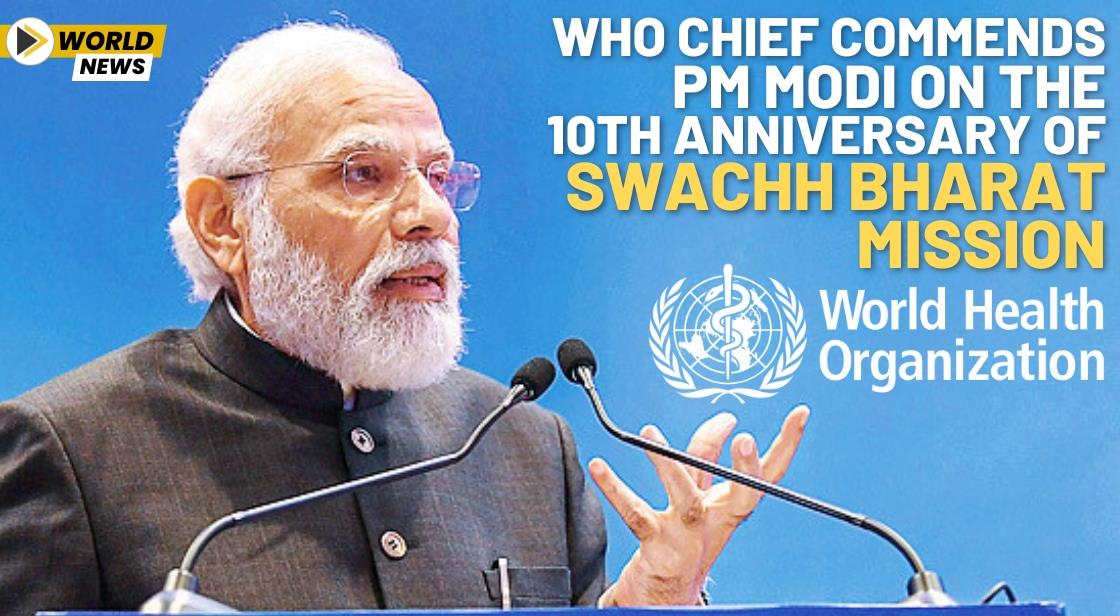WHO Chief Commends PM Modi on the 10th Anniversary of Swachh Bharat Mission

News Synopsis
On October 2, 2024, Tedros Adhanom Ghebreyesus, the Director-General of the World Health Organization (WHO), commended Prime Minister Narendra Modi for the significant achievements of the Swachh Bharat Mission as it celebrated its 10th anniversary. This initiative, launched in 2014, has played a crucial role in transforming India’s sanitation landscape and addressing public health challenges.
Key Achievements in Sustainable Development Goals
In his remarks, Dr. Ghebreyesus highlighted the substantial progress made in achieving Sustainable Development Goals (SDGs) through the Swachh Bharat Mission. He noted that this transformative initiative has effectively mobilized communities to foster a cleaner and healthier environment across the nation. By prioritizing sanitation and hygiene, the Indian government has made remarkable strides toward enhancing public health.
"Tulsi Bhai" and Transformative Change
Affectionately referring to himself as "Tulsi Bhai," the WHO Director-General expressed his honor in participating in the celebrations. He emphasized that the success of the Swachh Bharat Mission is a testament to how strong political commitment can drive transformative change. This initiative has mobilized resources and engaged communities, igniting a movement aimed at eliminating open defecation and promoting overall cleanliness.
Focus on Equity and Local Engagement
Dr. Ghebreyesus commended the mission’s focus on equity, accountability, and sustainability. He pointed out that the Swachh Bharat Mission prioritizes basic sanitation, particularly in rural and underserved areas. The program has effectively mobilized local leaders and utilized data to track its progress, ensuring that no community is left behind in the quest for improved sanitation.
Public Health Benefits and Disease Reduction
Highlighting the public health benefits derived from the Swachh Bharat Mission, Dr. Ghebreyesus stated that initiatives like this lead to significant improvements in sanitation and health. By reducing the prevalence of diseases such as diarrhea and malnutrition, the mission has the potential to save countless lives and improve the overall quality of life for millions of Indians.
Long-term Well-being and Socio-economic Development
The WHO chief acknowledged the broader impact of the Swachh Bharat Mission on long-term well-being and socio-economic development within communities. By improving sanitation, the initiative not only enhances public health but also contributes to economic growth and social stability.
Ayushman Bharat Scheme: A Complementary Initiative
In addition to praising the Swachh Bharat Mission, Dr. Ghebreyesus also commented on the Ayushman Bharat national health protection scheme. He highlighted this initiative as another demonstration of the Indian government's commitment to improving the health and well-being of its vast population. The dual focus on sanitation and health insurance illustrates a comprehensive approach to public health.
Acknowledgment of India's Leadership
Concluding his address, Dr. Ghebreyesus expressed his gratitude to India for its leadership in public health initiatives. He remarked, "Thank you for your leadership, and may your achievement be an inspiration for the world." His words reflect the global recognition of India’s efforts to address sanitation and health challenges.
Tribute to Mahatma Gandhi and the Mission's Origins
The 10th anniversary of the Swachh Bharat Mission coincided with the 155th birth anniversary of Mahatma Gandhi, India’s founding father. Earlier in the day, Prime Minister Modi paid tribute to Gandhi, reinforcing the mission's roots in the principles of cleanliness and social responsibility. He shared his involvement in Swachhata-related activities on social media, encouraging others to participate in similar efforts.
Call to Action for Continued Participation
In his social media post, PM Modi urged citizens to actively engage in cleanliness initiatives throughout the day. He emphasized the importance of continuing to strengthen the Swachh Bharat Mission, inviting everyone to contribute to the ongoing movement for a cleaner and healthier India.
The Swachh Bharat Mission: A Transformative Journey
Initiated in 2014, the Swachh Bharat Mission aimed to make India Open Defecation Free (ODF) and has since evolved into a powerful movement for change. The efforts of the Indian government, in collaboration with communities and organizations like the WHO, have created a lasting impact on the nation’s sanitation and health landscape.
Conclusion
The praise from Dr. Ghebreyesus underscores the global significance of the Swachh Bharat Mission as a model for other countries aiming to improve sanitation and public health. As India marks this important milestone, the continued commitment to these initiatives will be vital in achieving a cleaner, healthier future for all citizens. The collaborative efforts and political will displayed in this mission serve as an example of what can be accomplished when communities and governments unite for a common cause.









